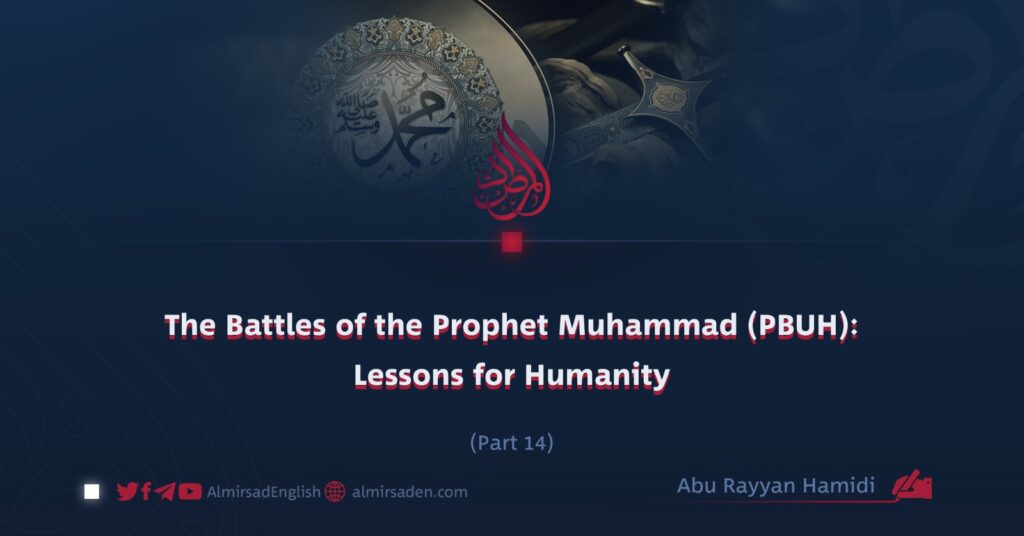Part 14
Abu Rayyan Hamidi
The Ransoming of Prisoners of War
Upon the return of the Muslim army to Madinah al-Munawwarah following the Battle of Badr, the Messenger of Allah (PBUH) consulted his noble companions regarding the fate of the prisoners of war.
Abu Bakr al-Siddiq (RA) advised,
“Let us take ransom from them. They are our relatives and family members. Perhaps, through this act, the light of Islam may enter their hearts. Moreover, the ransom will provide us with financial strength.”
The Prophet (PBUH) then sought the opinion of Umar ibn al-Khattab (RA), who responded,
“They should be executed. Let each companion be assigned his own relative among the captives to strike their necks. This will send a clear message to the polytheists that there is no place for mercy in our hearts toward them.”
Ultimately, the Messenger of Allah (PBUH) accepted the view of Abu Bakr (RA) and released the prisoners in exchange for ransom. However, this decision was not applied uniformly. Those who lacked the financial means were released without payment. As for those who were literate, they were required to teach ten Muslim children how to read and write as their form of ransom. It was during this time that Zayd ibn Thabit (RA), the Prophet’s scribe, also learned to write.
Umar (RA) later recalled,
“The next morning, I found the Prophet (PBUH) and Abu Bakr (RA) weeping. Allah, the Almighty, had revealed verses of reproach in response to the acceptance of ransom.”
“It is not for a prophet to have captives [of war] until he inflicts a massacre [upon Allah ‘s enemies] in the land. Some Muslims desire the commodities of this world, but Allah desires [for you] the Hereafter. And Allah is Exalted in Might and Wise.”
(Surah Al-Anfal, 8:67)
When the victorious army reached Madinah, the Prophet (PBUH) distributed the prisoners among the noble Companions for safe custody. He instructed them with the profound words,
“Treat the captives well.”
This command reflected the unmatched ethics of Islamic warfare. Victorious armies typically executed the defeated, and when they did not, forgiveness was seen as an extraordinary act of mercy. However, in obedience to the Prophet’s instruction, the Companions would feed the prisoners first. If any food remained, they would eat it themselves or share it with their families. If nothing was left, they would survive on dates.
Abd al-Aziz ibn Umair, the brother of Mus’ab ibn Umair (RA), narrated,
“I was held by an Ansari companion. He and his family would prepare a small amount of bread for me morning and evening while they survived on dates. When I insisted that they eat instead, they replied, ‘The Prophet (peace be upon him) instructed us to treat the captives with kindness.'”
Such was the level of sacrifice, generosity, and moral commitment that laid the foundations of a global Islamic civilization. Even the mighty Roman and Persian empires could not withstand the spiritual and ethical force of these sincere believers.
Among the prisoners of Badr was the Prophet’s (PBUH) own son-in-law, Abū al-ʿĀṣ ibn al-Rabīʿ, the husband of Zaynab (may Allah be pleased with her). As part of the ransom process, Zaynab sent a necklace that her mother Khadijah (may Allah be pleased with her) had gifted her at the time of her marriage. Upon recognizing the necklace and consulting the Companions, the Prophet (PBUH) returned it to Zaynab and released Abu al-‘As on the condition that he would not prevent her from migrating to Madinah. He later embraced Islam.
Several others were released without ransom, including al-Mutlib ibn Hantab, Sayfi ibn Abi Rafi’ah, and Abu ‘Azza ‘Amr ibn ‘Abdullah. Abu ‘Azza, a poor man and father of daughters, pleaded with the Prophet (PBUH), citing his inability to pay. The Prophet, moved by his situation, released him unconditionally. From that day on, Abu ‘Azza frequently composed poetry in praise of the Prophet and expressed deep gratitude for his generosity and mercy.
Another significant incident involved Umayr ibn Wahb, whose son had been captured at Badr. Under the guise of negotiating his son’s release, Umayr traveled to Madinah with the hidden intention of assassinating the Prophet. However, Umar ibn al-Khattab (RA), suspicious of his motives, arrested him and brought him before the Prophet in chains.
When questioned, Umayr insisted that he had come only to secure his son’s freedom. The Prophet (PBUH) then said,
“What about your secret conversation with Safwan beside the Ka‘bah?”
Shocked that the Prophet (PBUH) knew of this private exchange, Umayr immediately testified,
“I bear witness that there is no deity but Allah, and I bear witness that Muhammad is His servant and Messenger.”
In truth, Umayr and Safwan had conspired at the Ka‘bah. Safwan promised to care for Umayr’s family if he succeeded in assassinating the Prophet. Yet, by the will of Allah, Umayr had not traveled to extinguish the light of Prophethood, but to be illuminated by it.
